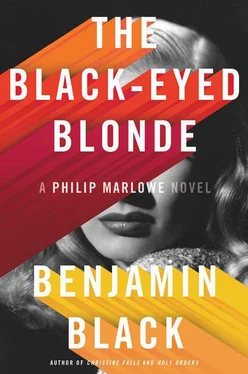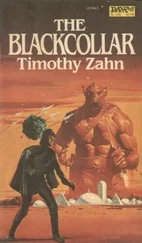I don’t know why they call it Ocean Heights, since about the only thing high about it would be the maintenance costs. The house wasn’t all that big, if you consider Buckingham Palace a modest little abode. Langrishe Lodge, it was called, though I couldn’t imagine anything less like a lodge. It was made of pink and white stone, lots of it, and had turrets and towers, and a flag flying proudly on a flagpole on the roof, and about a thousand windows. It looked pretty ugly to me, but I’m no judge of architecture. Off to the side there were big green trees, some variety of oaks, I thought. The short drive led straight to an oval of gravel in front of the house that you could have run a chariot race on. It struck me that I was in the wrong trade, if a pile like this was what you got for making women smell nice.
During the drive over I had been thinking of what Clare Cavendish had said about liking music. I hadn’t picked up on it, hadn’t asked her what kind of music she preferred, and she hadn’t offered to tell me, and somehow that was significant. I mean, it was significant that we had let it go. It wasn’t the most intimate thing she could have told me, not like her shoe size or what she wore or didn’t wear to bed at night. All the same, it had weight, the weight of something precious, a pearl or a diamond, that she had passed from her hand into mine. And the fact that I had taken it from her without comment, and that she had been content for me to say nothing, meant it was something held in secret between us, a token, a promise for the future. But then I decided that this was probably all hooey, just a case of wishful thinking on my part.
When I had parked the Olds on the gravel, I noticed a sporty-looking young man coming toward me across the lawn. He was swinging a golf club and knocking the heads off daisies with it. He wore two-tone golf shoes and a white silk shirt with a floppy collar. His dark hair was floppy too, a wing of it falling over his brow so that he had to keep pushing it out of his eyes with a nervous flick of a pale and slender hand. He walked in a willowy sort of way, meandering a little, as if there were a weakness somewhere in the region of his knees. When he got close I saw with a shock that he had Clare Cavendish’s almond-shaped black eyes — they were much too pretty for him. I saw too that he wasn’t nearly as young as he’d seemed at a distance. I guessed he was in his late twenties, though with the light behind him he could have passed for nineteen. He stopped in front of me and looked me up and down with a faint sneer. “You the new chauffeur?” he asked.
“Do I look like a chauffeur?”
“I don’t know,” she said. “What do chauffeurs look like?”
“Leggings, cap with a shiny peak, insolent stare of the proletarian.”
“Well, you haven’t got the leggings or the cap.”
He had, I noticed, an expensive smell, cologne and leather and something else, probably that perfumed tissue paper they pack Fabergé eggs in. Or maybe he liked to dab on a bit of his ma’s finest. He was a precious lad, all right. “I’m here to see Mrs. Cavendish,” I said.
“Are you now.” He snickered. “Then you must be one of her beaux.”
“What do they—?”
“Rugged, blue-eyed types. On second thought, you’re not that kind of material either.” He glanced past me at the Olds. “They come in scarlet coupés”—he pronounced it the French way—“or the odd Silver Wraith. So who are you?”
I took a bit of time to light a cigarette. For some reason this seemed to amuse him, and he did that mean little laugh again. It sounded forced; he so much wanted to be a tough guy. “You must be Mrs. Cavendish’s brother,” I said.
He gave me a wide-eyed theatrical stare. “Must I?”
“Some part of the family, anyway. Which are you, pampered pet or black sheep?”
He lifted his nose a disdainful inch into the air. “My name,” he said, “is Edwards, Everett Edwards. Everett Edwards the Third, as it happens.”
“You mean there’ve been two of you already?”
He relented a bit then and grinned, rolling his shoulders in a boyish shrug. “Stupid name, isn’t it,” he said, biting his lip.
I did my own kind of shrug. “We don’t get to choose what we’re called.”
“What about you — what are you called?”
“Marlowe.”
“Marlowe? Like the playwright.” He struck a histrionic pose, leaning sideways from the hips and pointing toward the sky with a trembling hand. “ See, see, where Christ’s blood streams in the firmament! ” he cried, making his lower lip quiver. I had to smile.
“Tell me where I can find your sister, will you?” I said.
He let his arm fall and straightened up to his former slouch. “She’s here somewhere,” he said. “Try the conservatory.” He pointed. “It’s around that way.”
He couldn’t keep that sulky look out of his eyes. He was just an overgrown kid, spoiled and bored. “Thanks, Everett the Third,” I said.
As I walked away he called after me, “If you’re selling insurance, you’re wasting your time.” He snickered again. I hoped for his sake it was something he would grow out of — when he got into his fifties, maybe, and started wearing three-piece suits and sporting a monocle.
I crunched across the gravel and took the way he had pointed to, along by the side of the house. Stretching off to my left, the garden was the size of a small public park, only much better kept. The sweet smell of roses was carried to me on a breeze, along with the scent of cut grass and a briny whiff of the nearby ocean. I wondered what it would be like to live in a place like this. I glanced in through the windows as I walked past them. The rooms, what I could see of them, were large, lofty, and impeccably furnished. What if you wanted to flop in front of the television set with a bucket of popcorn and a couple of cans of beer and watch a ball game? Maybe they had specific places in the basement for that kind of thing, billiard rooms, romper rooms, dens, whatever. I suspected that in Langrishe Lodge, the real business of living would always be carried on somewhere else.
The conservatory was an elaborate affair of curved glass and steel framing attached to the back of the house like a monstrous suction cup and reaching up two or three stories. There were giant palms inside, pressing their heavy fronds against the panes as if appealing to be let out. A pair of French doors stood wide, and in the opening a white gauze curtain undulated languidly in the gently stirring air. Summer in these parts isn’t harsh and punishing like it is over in the city; these folks have their own special season. I stepped across the threshold, batting the curtain aside. In here the air was heavy and dense and smelled like a fat man after a long, hot bath.
At first I didn’t spot Clare Cavendish. Partly hidden by a low-leaning swath of palm leaves, she was sitting on a delicate little wrought-iron chair, before a matching wrought-iron table, writing in a leather-bound diary or notebook. She wrote with a fountain pen, I noticed. She was dressed for tennis, in a short-sleeved cotton shirt and skimpy white skirt with pleats, ankle socks, and pipe-clayed bucks. Her hair was pinned back with barrettes at both sides. I had not seen her ears before. They were very pretty ears, which is a rare thing, ears being in my estimation just a little less weird-looking than feet.
She heard me approach, and when she glanced up a look came into her eyes that I couldn’t quite figure. Surprise, of course — I hadn’t called to say I was coming — but something else, too. Was it alarm, sudden dismay even, or did she just not recognize me for a second?
“Good morning,” I said, as lightly as I could.
Читать дальше












